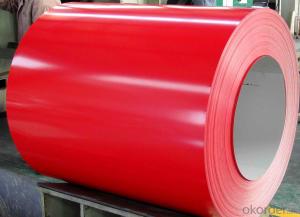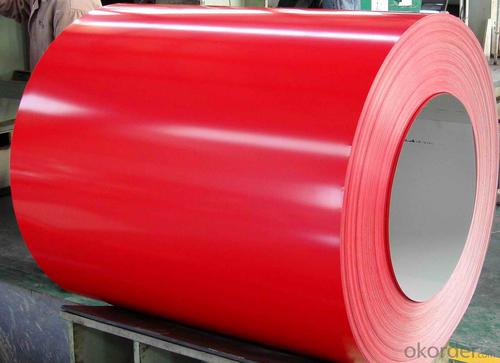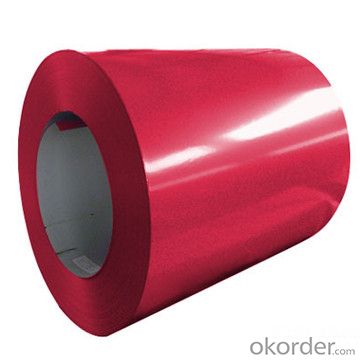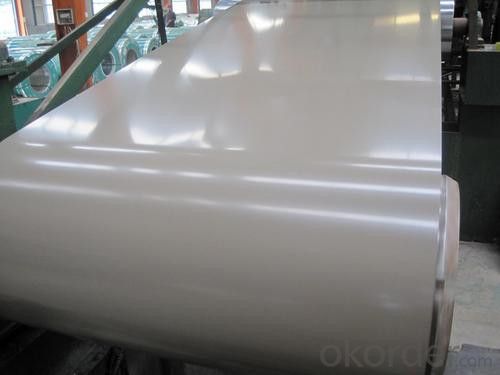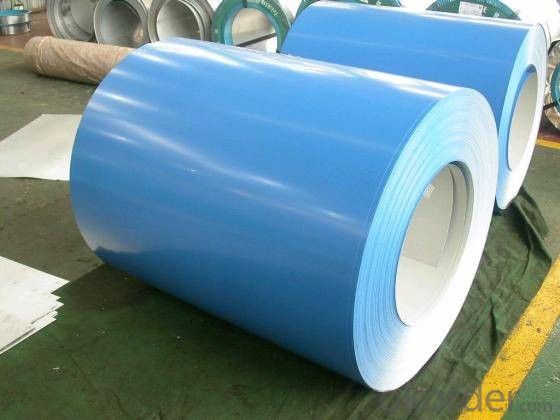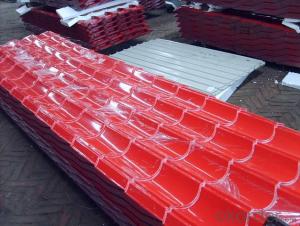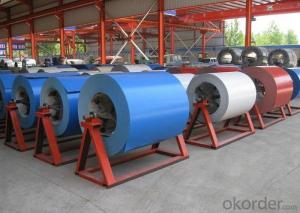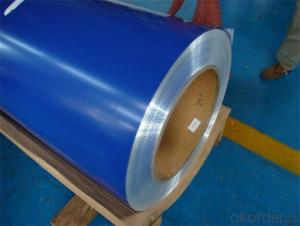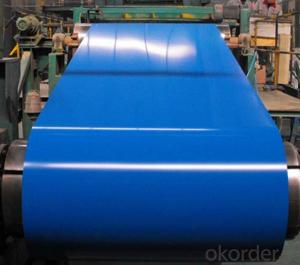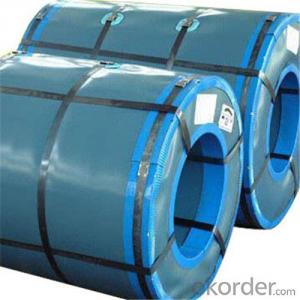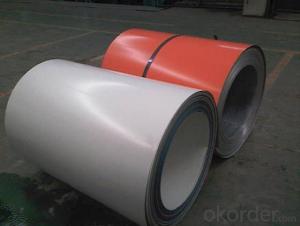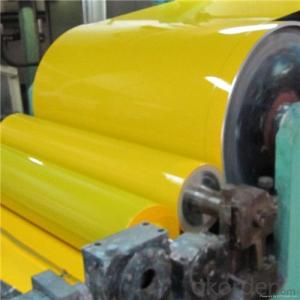Prepainted Rolled Steel Coil For construction Roofing Constrution
- Loading Port:
- Shanghai
- Payment Terms:
- TT OR LC
- Min Order Qty:
- 50 m.t.
- Supply Capability:
- 30000 m.t./month
OKorder Service Pledge
OKorder Financial Service
You Might Also Like
Structure of Prepainted Rolled steel Coil for Construction Roofing
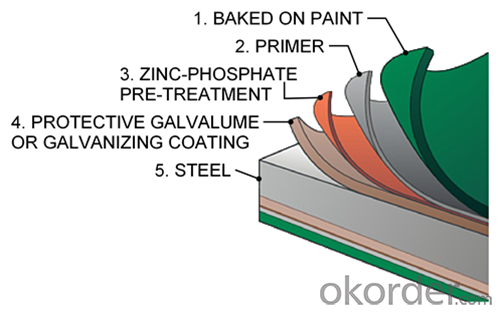
Description of Prepainted Rolled steel Coil for Construction Roofing
Prepainted Rolled steel Coil is a kind of coated steel coil/sheet. With the cold rolled steel of different strength and thickness as substrate, it is produced through applying Al-Zn coat on both faces by hot dip process. In its coating, Al accounts for about 55%, Si 1.6%, while the remaining is Zn. Aluminum zinc coils enjoys both the physical protective feature and durability of Al and the electrochemical protective property of Zn. And its surface has bright silver color and regular embossed-like figure, which are highly decorative.
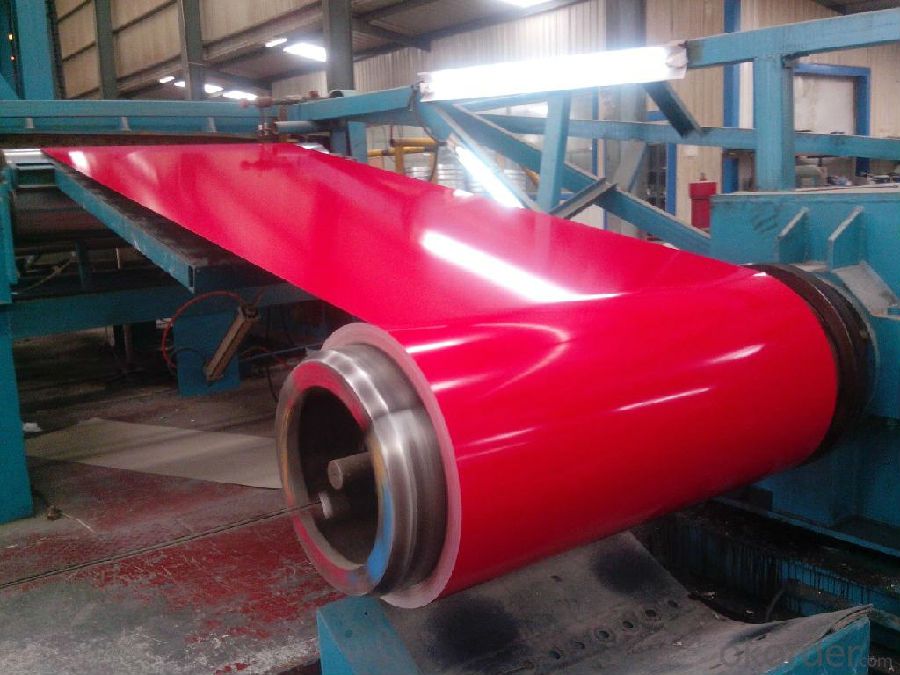
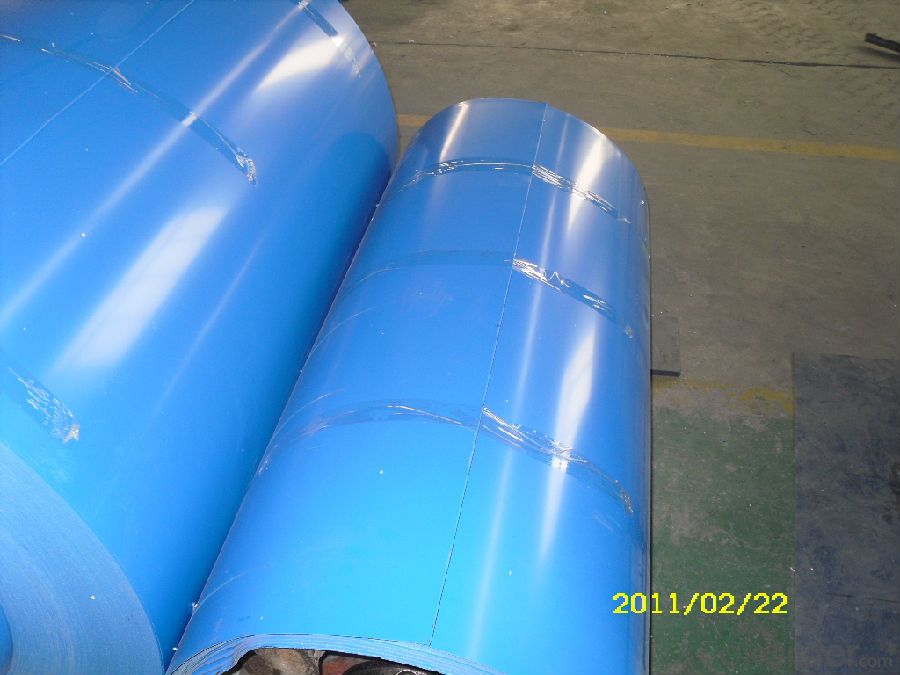
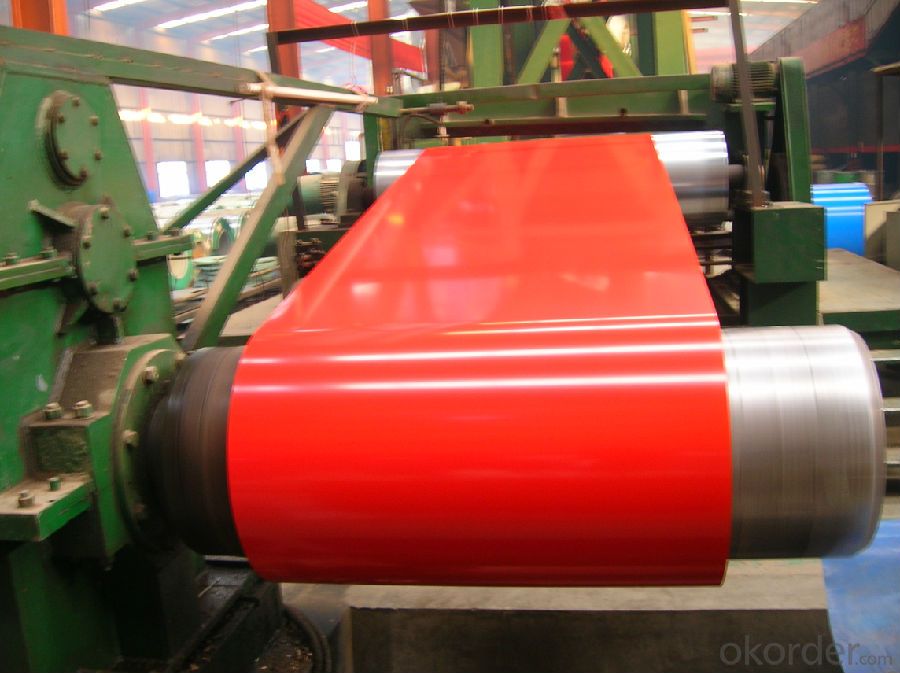
Main Feature of Prepainted Rolled steel Coil for Construction Roofing
1.Corrosion resistance: It mainly depends on the aluminum protection. When the zinc being worn, the aluminum will form a dense layer of aluminum oxide, resist corrosion material to prevent further corrosion inside.
2. Heat resistance: Aluminum zinc alloy steel sheet has excellent heat resistance, can withstand high temperatures over 300 centigrade, and is similar with aluminized steel high temperature oxidation resistance. It often used in chimney pipes, ovens, fluorescent lighting device and the device cover.
3. Heat reflective: Galvanized steel plate heat-reflective high rate is twice as galvanized steel, often used to make insulation materials.
4. Economy: Because density of 55% AL-Zn is smaller than the density of Zn, so in the same weight and thickness of Galvanized zinc layer, aluminum-zinc steel plate is larger area more than 3% of galvanized steel sheet.
Applications of Prepainted Rolled steel Coil for Construction Roofing
1. Construction and building: roofing; ventilating duct; handrail; partition panel;etc.
2. Electric appliance: refrigerator; washing machine; refrigerator; DVD;etc.
3.Transportation: oil tank; road sign; etc.
4.Agriculture:barn; etc.
5.Others:vending machine; game machine; etc.
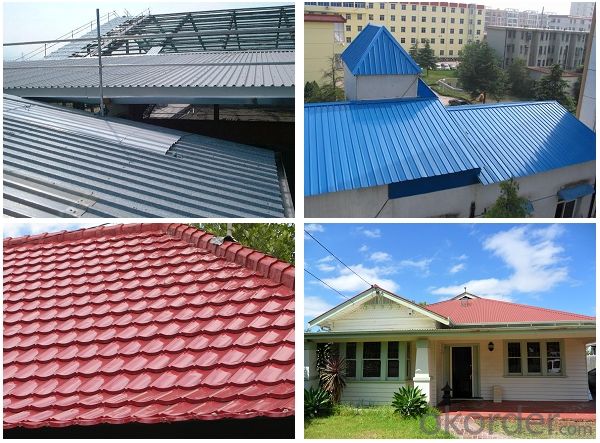
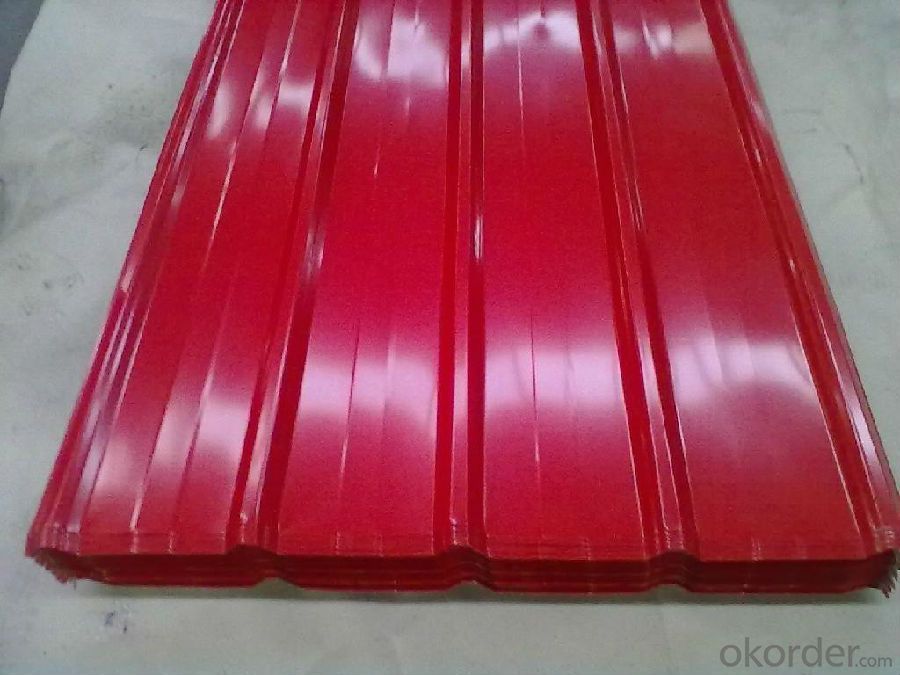
Specifications of Rolled steel Coil for Construction Roofing
Product | Prepainted Rolled steel Coil for Construction Roofing |
Material Grade | SGCC / SGCH / DX51D+AZ, etc |
Thickness | 0.2-3.0mm |
Width | 600-1500mm |
Tolerance | Thickness: +/-0.02mm , Width:+/-2mm |
Zinc-coating | AZ40-150g/m2 |
Technique | Raw material: Hot rolled steel coil --> Cold rolled_>hot dipped galvalume |
Surface | Dried, Chromated, Unoiled |
Spangle | Regular spangle , small spangle, zero spangle |
ID | 508MM |
Coil weight | 10MT max |
Export package | Cardboard inner sleeves, Waterproof paper, galvanized steel covered and steel strip packed |
FAQ of Prepainted Rolled steel Coil for Construction Roofing
We have organized several common questions for our clients,may help you sincerely:
1. What is the minimum order quantity ?
Our MOQ is 50mt for each size. And we will consider to give more discount if you make big order like 1000 tons and more. Further more, the more appropriate payment term your offer the better price we can provide.
2. How long can we receive the product after purchase?
Usually within thirty working days after receiving buyer’s advance payment or LC. We will arrange the factory manufacturing as soon as possible. The cargo readiness usually takes 15-25 days, but the shipment will depend on the vessel situation.
3. How to guarantee the quality of the products?
We have established the international advanced quality management system,every link from raw material to final product we have strict quality test;We resolutely put an end to unqualified products flowing into the market. At the same time, we will provide necessary follow-up service assurance.
- Q: How can I tell the wear resistance, strength, ect from the name of the steel?how could I tell the difference between 420 and 440 steel. what does the HC in 420 HC steel mean? what do the numbers and letters in s30v steel mean?
- If your question implies how to tell the differences just by looking at the actual knife then I'd say there is no real way to do that. Just about all high carbon steel's look alike. You should be able to tell the difference between a stainless steel, but which one is anybodies guess, and a carbon steel however.
- Q: How do steel coils contribute to the circular economy?
- Steel coils contribute to the circular economy by enabling the recycling and reuse of steel. When products reach the end of their life cycle, steel coils can be easily melted down and repurposed to create new products. This reduces the need for extracting virgin materials, saves energy, and minimizes waste. Additionally, the durability and long lifespan of steel coils ensure that they can be used in multiple cycles, further promoting a sustainable and circular approach to manufacturing and consumption.
- Q: full discription about hydrolics used in steel melting shop with hyd valve is use in thair circit too ?
- The correct spelling is hydraulics. I haven't heard the term steel melting shop you probably means a foundry or a steel mill The most obvious example i can think of is hydraulic-operated fork lifts. Hydraulic cylinders are used to lift the forks and to tilt them upwards or downwards. The valves are coneccted to levers next to the steering wheel. Hydraulic pressure is supplied by a hydraulic pump driven by a propane or diesel engine. In some forklift designs the wheels are also not connected directly to the engine, but driven by hydraulic motors. There are also a large variety of machines used in steel mills and metalworking companies to cut and shape metal parts. for example, press brakes, plate cutting shears, stamping presses, hole punch machines, drawing presses, etc. These types all operate in much the same basic way. They use a very large cylinder or group of cylinders to apply many tons of force to different kinds of metal working tools.
- Q: What are the different methods of embossing steel coils?
- There are several methods of embossing steel coils, including roller embossing, heat embossing, and laser embossing. Roller embossing involves using engraved rollers to press a pattern onto the steel surface. Heat embossing uses heat and pressure to create raised designs on the steel coils. Laser embossing utilizes laser technology to etch intricate patterns onto the steel surface. These methods allow for the creation of unique textures and designs on steel coils for various applications.
- Q: Can steel coils be coated with fire-resistant materials?
- Yes, steel coils can be coated with fire-resistant materials.
- Q: is broken steel the only fallout dlc that will raise the level cap from 20 to 30? also do i have to complete the main quest to play it? which fallout dlc do you think would be the best to get?
- Yes, Broken Steel is the only DLC that raises your level cap. Yes, you have to complete the main quest to play it. It's kind of a prologue to the events of the ending. If you don't have the DLC and complete the game it just ends and you can't play it anymore. With the DLC you'll be able to continue playing. As for which one to get, that's your preference. Most people like the Broken Steel because it has to do with the main story and it raises the level cap - so that's the one I'll suggest to you. I also think The Pitt and Point Lookout are worth getting as well. Mothership Zeta is the one I liked least. I thought it was kind of stupid, to be honest. Operation Anchoarge is a simulation and it's pretty fun, but I don't think it's worth the $9.99.
- Q: How do steel coils contribute to sustainability in manufacturing?
- There are several ways in which steel coils contribute to sustainability in manufacturing: 1. Recycling plays a crucial role: Steel is one of the world's most recycled materials, boasting a recycling rate above 90%. Steel coils are made from recycled steel and can be recycled again at the end of their lifespan. This reduces the reliance on raw materials extraction, conserves natural resources, and decreases energy consumption and greenhouse gas emissions associated with steel production. 2. Durability is a key factor: Steel is renowned for its strength and durability. Steel coils are specifically designed to withstand heavy loads, extreme temperatures, and harsh environmental conditions. Consequently, products made from steel coils, such as automotive parts, construction materials, and appliances, have a longer lifespan. This diminishes the need for frequent replacements and minimizes waste. 3. Energy efficiency is improved: Steel coils are utilized in various manufacturing processes, including stamping, forming, and welding. These processes require less energy when working with steel coils compared to other materials. Steel's high strength-to-weight ratio allows for the production of lightweight yet strong components, reducing energy consumption during transportation and enhancing fuel efficiency in vehicles. 4. Emissions are reduced: Steel coils contribute to sustainability by assisting manufacturers in lowering their emissions. Steel is a low-carbon material, emitting fewer greenhouse gases compared to materials such as aluminum or plastics. By employing steel coils, manufacturers can reduce their carbon footprint and contribute to climate change mitigation efforts. 5. The circular economy is promoted: Steel coils play a crucial role in the circular economy, which aims to minimize waste and maximize resource efficiency. Steel coils can be easily recycled and reused, ensuring their continued presence in the production cycle. This diminishes the need for virgin materials and encourages a more sustainable and circular approach to manufacturing. To conclude, steel coils make significant contributions to sustainability in manufacturing by being recyclable, durable, energy-efficient, emission-reducing, and promoting a circular economy. By selecting steel as a material and utilizing steel coils, manufacturers can take significant steps towards reducing their environmental impact and fostering a more sustainable manufacturing industry.
- Q: How do steel coils contribute to the construction equipment industry?
- Steel coils are essential in the construction equipment industry as they are used to manufacture various components like beams, plates, and tubes. These coils provide the necessary strength and durability needed for constructing heavy machinery and equipment. Additionally, steel coils are also utilized in the fabrication of structural frameworks, reinforcing bars, and other critical parts, ensuring the integrity and safety of construction equipment.
- Q: How are steel coils used in the production of solar panels?
- Steel coils are not directly used in the production of solar panels. However, steel is typically used in the manufacturing of the structural frames and mounting systems for solar panels. These frames and mounting systems provide support and stability to the solar panels, ensuring their proper installation and long-term durability.
- Q: How are steel coils inspected for weldability?
- Steel coils are inspected for weldability through a series of comprehensive tests and examinations. The main objective of this inspection is to assess the quality and suitability of the steel coils for welding processes. Firstly, visual inspection is conducted to identify any visual defects or irregularities on the surface of the coils. This includes checking for surface roughness, cracks, scratches, or any other imperfections that may affect the weldability. Next, destructive testing methods such as tensile testing and impact testing are performed. Tensile testing measures the strength and ductility of the steel, ensuring it meets the required mechanical properties for welding. Impact testing evaluates the steel's resistance to brittle fracture, which is crucial in determining its weldability. Furthermore, non-destructive testing techniques such as ultrasonic testing (UT) and magnetic particle inspection (MPI) are employed to detect internal defects and discontinuities. UT uses high-frequency sound waves to identify any hidden flaws within the steel, while MPI utilizes magnetic particles to identify surface and near-surface defects. Additionally, chemical analysis is carried out to determine the steel's composition and ensure it meets the required specifications for welding. This analysis involves checking the levels of carbon, manganese, sulfur, and other elements that may affect the weldability and overall performance of the steel. Moreover, weldability testing is performed to evaluate the steel's response to welding processes. This involves conducting various welding trials using different techniques and parameters to determine the steel's behavior during welding, such as its susceptibility to cracking, distortion, or other welding-related issues. Overall, the inspection of steel coils for weldability is a multi-faceted process that combines visual, destructive, non-destructive, chemical, and weldability testing methods. By conducting these thorough inspections, manufacturers can ensure that the steel coils meet the required standards and are suitable for welding applications.
Send your message to us
Prepainted Rolled Steel Coil For construction Roofing Constrution
- Loading Port:
- Shanghai
- Payment Terms:
- TT OR LC
- Min Order Qty:
- 50 m.t.
- Supply Capability:
- 30000 m.t./month
OKorder Service Pledge
OKorder Financial Service
Similar products
Hot products
Hot Searches
Related keywords
